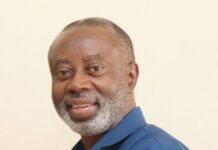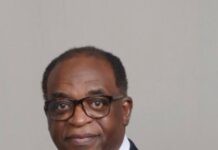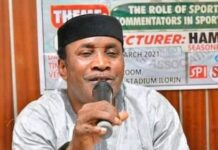
Trying to fit him into a mold can be sometimes problematic. I have always thought of him as a teacher and mentor. And later, only much later, as a friend. For over three decades he has been more than enough in each of these roles.
My path with Dr. Yemi Osinbajo, as he then was, first crossed at the University of Lagos when he was a lecturer at the Faculty of Law and I was a student at the Department of Mass Communication at the same university. Just a busybody trying to indulge my fantasy of becoming a pocket lawyer, I met him out of curiosity.
One of his students and good friend of mine who passed on many years ago, Sunday Okoli, fondly called Harry, gave the impression that the Law Faculty had four of the university’s biggest talisman – Jelili Omotola, Oyelowo Oyewo, Amos Utuama and Osinbajo.
One day, I strayed into one of Osinbajo’s classes in what can only be described as ambulatory trespass. I was struck by his charm, ease of delivery and how his students connected with him. I thought to myself as I snuck out, with a lecturer like this, perhaps I should have studied law? I never returned to his class but that encounter stayed with me.
I followed him through the many pleasant stories Harry told of him but our paths never crossed again until many years later when he was appointed Attorney General and Commissioner for Justice in Lagos by Governor Bola Ahmed Tinubu.
In 1999, Lagos was a mess. A big mess.
Although the city still retained its vibrancy and boisterousness as the country’s commercial capital, years of neglect and centralised government had robbed it of vital energy, threatening to bury it in crime and filth.
To make matters worse for a new government at the time, a nasty turf war between the PDP-controlled central government and the six AD states in the South-West (including Lagos), meant that any serious attempt at clean-up which obviously required significant resources from the centre, would be a tug of war.
President Olusegun Obasanjo, smarting from the humiliation of the 1999 election in which he was roundly rejected by his home base, the South-West, was not in any mood to do Lagos or any other states in the region any favours.
The mission to clean up, rebuild and renew the city (among several other election promises made by Tinubu) would require tough, even brutal, political engagement; no less than it would also involve soft skills, especially prudent and robust use of the law, to clear landmines and claw back vast subnational territory long appropriated by the unitarist state, rendering the federating units mere appendages of the centre.
It was in the pursuit of this latter part that Osinbajo, a member of Tinubu’s outstanding cabinet at the time, had to deploy his legal genius in public service for the first time outside the classroom.
Leading human rights activist and senior advocate of Nigeria, Femi Falana, once told me that even though political activism will continue to be a major tool to restructure Nigeria, the progress made through legal activism has been largely understated.
Before Rivers State Governor Nyesom Wike made VAT a court issue, challenging the right of the federal government to collect the taxes from the state, Lagos had been there in its quest to expand its income and the relative autonomy of the constituent states by testing the law.
Osinbajo led Lagos in a series of litigations to claw back swathes lost to federal meddling in areas such as creation of local governments, physical planning, title registration, registration and production of vehicle number plates and casino licensing. In the area of physical planning and title registration specifically, the court ruled that the federal government has no land. The Land Use Act vests ownership and control of land in state governments.
In a ruling in 2019 in a case earlier originated by Lagos State when Osinbajo was AG, the state also secured a judgement that upheld its right to charge and collect consumption tax from hotels, restaurants and event centres within the state.
The judgement is based on the principle that the power to impose consumption tax is on the Residual List. This judgement was also given against the FIRS that deemed that it had the right to collect those taxes.
These battles on legal interpretations of the Constitution are not cut and dried. The dispute that arose over the right of control of inland waterways between the federal and state governments, for example, was fought in court for over 10 years, before a ceasefire was brokered between the National Inland Waterways Authority and Lagos State.
Perhaps one of the most remarkable legal battles of all in Osinbajo’s time in Lagos was in the case of Attorney General of Lagos State v. Attorney General of the Federation 2004, a feisty and protracted legal tango in which Lagos sought to recover local government funds seized by Obasanjo after his futile attempt to crush and capture Tinubu’s government in an electoral heist which claimed five of the six states in the South-West region for the PDP.
That recovery effort, in the words of Osinbajo, “made Lagos to start thinking like a sovereign.” It set the tone for raising the state’s Internally Generated Revenue (IGR) from around N600 million monthly in 1999 to N45 billion as of 2021.
It also set the tone for Osinbajo’s performance on the bigger stage.
Have you seen him lately? His hair has greyed not a little since he became Vice President eight years ago. Which is a little surprising considering that former President Goodluck Jonathan, himself a former Vice President, once said a Vee Pee’s job is essentially to read newspapers.
Or to quote first US Vice President, John Adams, who described his office in a letter to his wife as, “the most insignificant contrivance” ever contrived by man.
But that’s precisely the source of Osinbajo’s festering grey hair. In the last eight years, the job of Nigeria’s vice president has been anything but a spare. He has been acting President during which time he took a few of the most consequential decisions.
His office has been at the heart of Nigeria’s first attempt to develop a social safety net programme. When COVID-19 hit with its depredations, the database from the safety net programme came in handy.
Osinbajo has been the Buhari government’s face-of-the-youth, rallying them, speaking to and for them on all things – from crypto to ICT and innovations. Surely, in a country where people under 40 form about 65 percent of the population, these exertions are more than “insignificant contrivance.”
I’m not so sure how meaningful his knowledge of the law and expertise in jurisprudence has been to this government. One thing he has been passionate about which the government has flaunted, however, is the Ease of Doing Business. It’s largely to his credit that Nigeria has improved from a ranking of 169 (out of 190 countries) in 2016 to 131 two years ago.
I have sometimes wondered what is next for him, after he leaves office. Of course, he has a thriving law practice from which he was extricated to serve as Buhari’s running-mate one fateful morning in December 2014 after an appearance in a case at the Supreme Court, Abuja. If he returns to his Chambers in Lagos, it may well be a holding place.
At 66, he remains a calm, thoughtful debater and fun to be around. He has inspired and challenged millions of people, especially the young and the young at heart across ethnic and party-lines, to believe. With an extraordinary sense of humour, a rock-solid wife and a heart of faith, his best years of service to God and country still lie ahead.
He is not only a teacher, mentor and friend. He is, above all, a leader for all times.
Ishiekwene is Editor-In-Chief of LEADERSHIP



